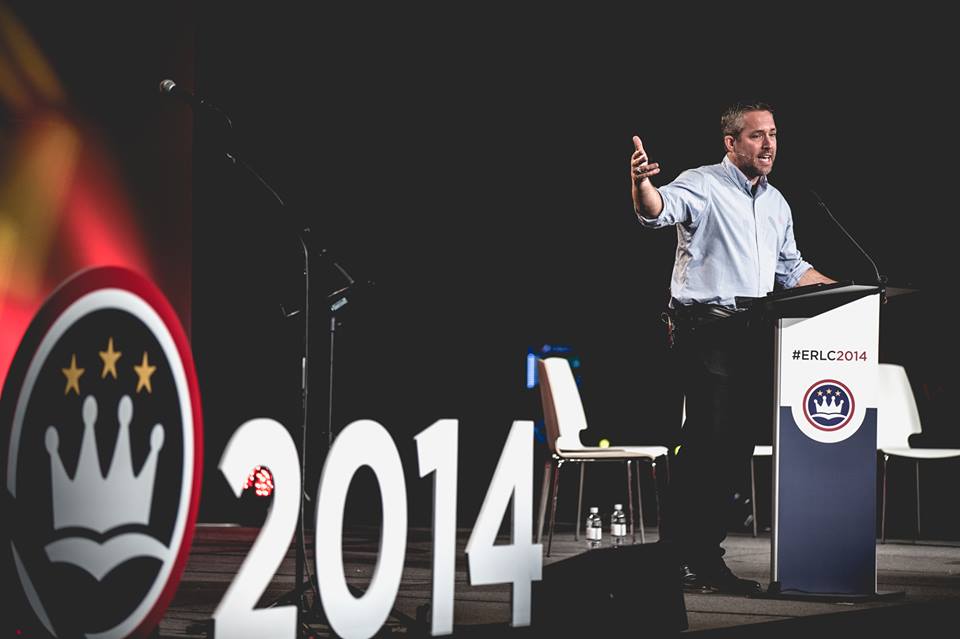
[SLIDESHOW=38989]NASHVILLE (BP) — Evangelical Christians should graciously and truthfully minister to homosexual people while also pursuing a family reformation, speakers said Wednesday (Oct. 29) in the final session of a Southern Baptist-sponsored conference.
A leading SBC pastor, Baptist educators and leaders in the movement to strengthen and protect marriage addressed attendees, who totaled more than 1,300 registrants, at “The Gospel, Homosexuality and the Future of Marriage,” the first national conference of the Ethics & Religious Liberty Commission.
Christians need not adopt the two-option narrative — “affirmation or alienation” — offered by American culture in regards to homosexuality, J.D. Greear told the audience in the closing address of the three-day conference. Instead, he said Jesus provides another alternative — “full of grace and truth” – that calls for courageous proclamation of God’s Word and compassionate outreach to human beings.
“As believers, as Christians, we have to love our gay neighbor more than we love our position on sexual morality, which means that our relationship with them must not be contingent upon their agreeing with us about sexuality,” said Greear, lead pastor of The Summit Church in Raleigh-Durham, N.C. “It means that when they disagree with us we don’t push them away.”
Dennis Rainey, president of FamilyLife, told attendees the church has “an unprecedented opportunity” at this cultural moment. Christians need the rallying cry of “a family reformation,” he said.
“[F]or many Americans, the unmet thirst for a good marriage, a solid family represents a need we must address as followers of Jesus Christ,” Rainey said. To have a family reformation, the church must “set its sights on becoming the marriage and family equipping center in their community,” he said.
Greear offered nine ways Christ’s teaching in the Gospels shows how “Jesus-representing churches” can minister with “grace and truth” to the lesbian, gay, bisexual and transgender (LGBT) community. Such churches, he said, will:
— Be known as the friends of the LGBT community.
— Not stigmatize sexual sin.
— Put forward God’s design for sexuality, not merely condemn its aberrations.
— Begin with a call to repentance.
— Not be bullied into silence.
— Preach the possibility of sexual-orientation change but acknowledge that may not happen in this life.
— Present the multi-faceted beauty of the Gospel in dealing with sexual sin.
— Not fear suffering for Christian confession.
— Not make sexual ethics, but the Gospel, the center of their message.”
Sexual ethics, Greear told the audience, “should not be central or dominant in our message. His cross should be.”
The Christian call for repentance should not focus exclusively on homosexuality, he said. “Our message is not simply, ‘Stop your sexual sin.’ Our message is, ‘Behold your God,’ because it is amazement at God’s love for us that delivers us from all the lesser attractions.”
He also said, “If what the Bible says about homosexuality is true, how can it be loving not to tell them?”
Greear apologized for the failure of Christians, including himself, to stand up to abuse and injustice toward those in the LGBT community.
“I think the question for us as church leaders is: Have you drawn the gay and lesbian community close?” he said. “Are you their friends? When you find out someone is gay, how interested are you in them as a person beyond their sexuality? Do you see them primarily as gay and lesbian or do you see them primarily as people created in the image of God just like you but with gay and lesbian desires? … Would gay and lesbian people feel loved to be in your home?”
In addition to calling for a family reformation, Rainey also urged husbands and wives to pray together daily and encouraged churches to “enlist, equip and empower couples to become missional.”
“Don’t ever threaten divorce in your marriage,” he said. “If you have, repent. Ask your spouse to forgive you. Get down on one knee with a child and weep and say, ‘That will never happen again.’
“We must repent of our cavalier attitude about divorce while at the same time loving those who are divorced.”
He told attendees, “The Great Commission begins at home, but it’s not intended to stay at home. The family is not designed by God to be a holy huddle but to pierce the darkness.”
Jason Allen, president of Midwestern Baptist Theological Seminary, said the biggest shift in parenting is “not only filtering” but of “interpreting culture in light of God’s Word.”
Allen, a member of a panel discussing the preparation of next-generation leaders for a “post-marriage culture,” pointed parents to the church. “Don’t underestimate the formative power of the local church, and have your family deeply immersed in the local church,” he said. Over 10 to 20 years, children in the church are “being formed holistically by the people of God.”
Steven Smith, vice president for student services and communication at Southwestern Baptist Theological Seminary, told the audience, “We have to avoid the persecution complex … wearing our feelings on our sleeves. The Gospel is bigger than that.”
Ryan Anderson, an expert on marriage and religious freedom at the Heritage Foundation, addressed the clash between “sexual freedom and religious liberty.”
“Government ultimately should respect the rights of all citizens,” he said. “And a form of government that’s respectful of free association and free contracts and free speech and free exercise of religion would protect citizens’ rights to live according to their beliefs that marriage is a union of a man and a woman. After all, protecting religious liberty and rights of conscience doesn’t infringe on anyone’s sexual freedom.”
Matt Boswell, pastor of ministries and worship at Providence Church in Frisco, Texas, led worship throughout the conference.
Videos of the conference sessions, which were held at the Opryland Retreat and Conference Center, are available at http://erlc.com/conference/liveblog/.
















